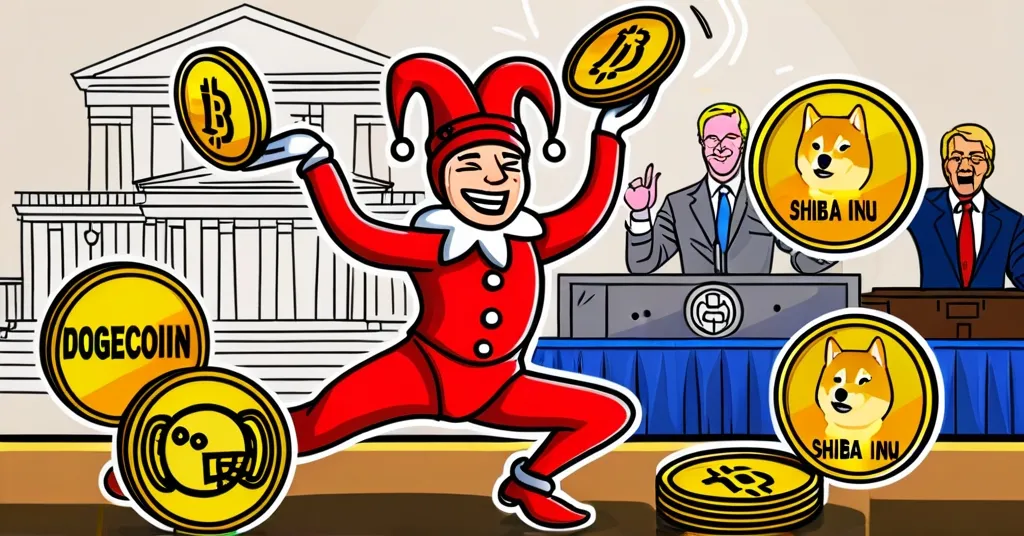Memecoins: Beyond the Joke – Real Use Cases, Legal Loopholes, and Cultural Impact

Exploring the Real Use Cases for the So-Hyped Memecoins
Memecoins, often brushed off as laughable novelties in the cryptocurrency world, have nevertheless captured a surprising portion of market interest. Despite their humorous origins, these digital assets are challenging conventional finance frameworks and are making a significant mark on both crypto markets and cultural narratives.
- Memecoins constituted 14.3% of CoinGecko’s market share in Q2 2024.
- They frequently bypass US securities law by avoiding defined use cases.
- Memecoins are used to voice political sentiments and support charitable initiatives.
- They offer a funding mechanism independent of venture capital.
The likes of Dogecoin and Shiba Inu exemplify this trend; they began as internet jokes but have carved out an undeniable niche. Their success is attributed to a combination of community backing and speculative trading. Although often accused of lacking substantive utility, memecoins have found cultural resonance and thus, a legitimate place in the cryptocurrency narrative.
Regulatory Loopholes of Memecoins
Their legal standing is intriguing. Memecoins manage to avoid US securities laws by lacking a clear use case. The Howey test—a legal yardstick for identifying securities—requires an investment contract to involve a common enterprise and an expectation of profits primarily from the efforts of others. By sidestepping these requirements, memecoins fall through regulatory cracks. Chris Dixon of A16z Crypto highlights this, noting:
“It’s actually safer to release a memecoin today with no use case than it is to launch a token that’s useful.”
Memecoins in Political Discourse
Beyond legal evasion, memecoins have emerged as platforms for political expression, allowing users to engage in and even mock political narratives. They’ve been used to craft coins that align with or oppose certain political figures, effectively capturing the political zeitgeist and amplifying societal sentiments.
Philanthropic Ventures with Memecoins
Memecoins have socially conscious undertones, with some token supplies directed toward charitable causes. Vitalik Buterin, Ethereum’s co-founder, underscores the importance of these efforts, saying:
“Among the more interesting of the coins that I’ve seen are coins where a large portion of the token supply is dedicated to some kind of charity.”
Buterin himself has converted millions in memecoins to support philanthropic endeavors, demonstrating their potential beyond mere speculation.
Alternative to Venture Capital
Memecoins also disrupt traditional finance by offering a funding model that bypasses venture capital. This allows early investors to potentially accumulate wealth quickly, though with considerable risk. The absence of venture capital involvement democratizes investment but also introduces significant volatility.
Key Takeaways
- What are memecoins, and why are they popular?
Memecoins are cryptocurrencies viewed as jokes but gain traction due to community engagement and speculative appeal.
- How do memecoins evade US securities law?
By lacking practical use cases, they do not qualify as securities under the Howey test.
- What political implications do memecoins have?
They allow engagement with political narratives, expressing support or dissent towards political figures.
- Can memecoins contribute to charitable causes?
Yes, they fund initiatives like dog shelters and significant philanthropic donations.
- How do memecoins offer an alternative to venture capital funding?
They provide decentralized funding opportunities, bypassing traditional VC routes and offering potential quick gains.
Despite their whimsical roots, memecoins have become powerful and contentious entities in the digital currency landscape. They continue to influence community engagement, evade stringent regulations, and even support charitable acts, highlighting the unpredictable nature and potential of cryptocurrencies.



